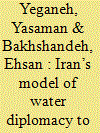|
|
|
Sort Order |
|
|
|
Items / Page
|
|
|
|
|
|
|
| Srl | Item |
| 1 |
ID:
190753


|
|
|
|
|
| Summary/Abstract |
After the Arab uprising of the early 2010s which changed the geopolitical shape of the Eastern Mediterranean, the Abraham Accords in 2020 marked the second most momentous development of the past decade, which drove more external players to the scene of geopolitics of the Mediterranean region. The Abraham Accords improved Israel’s relations with some Arab states of the Persian Gulf such as the UAE, Bahrain and Saudi Arabia and paved their way, under the full support of the United States, to heavily partake in geopolitical and geostrategic equations, mainly in energy and security nature, of the Eastern Mediterranean formulated mainly by Greece under the Neo-Democracy government. The present research explores the changing character of geopolitics in the Mediterranean and how Greece is playing its role in restructuring such a character. The findings of this research suggest that Greece is playing a prominent and leading role in transforming the geopolitics of the Eastern Mediterranean through security and energy initiatives for protection against possible aggression from Turkiye. Considering the supreme importance of the Mediterranean commercially and militarily for the United States, this article argues that the new design of geopolitics in the region is being shaped to protect Greece and Israeli interests in favour of the USA in the Eastern Mediterranean.
|
|
|
|
|
|
|
|
|
|
|
|
|
|
|
|
| 2 |
ID:
186389


|
|
|
|
|
| Summary/Abstract |
Many countries of the world are suffering from the adverse consequences of water scarcity. The United Nations has estimated that, by the middle of the present century, about 7 billion people in 48 countries, mostly from Southwest Asia, will encounter water scarcity. This may be expedited by the adverse consequences of climate change and global warming which would escalate the risk of war and conflict over transboundary resources. The present research explores the ways water diplomacy can mitigate the dire effects of water scarcity and promote “treaty making” and “institution building” as well as multilateral cooperation on shared waters. The focus is on Iran's water diplomacy with neighboring countries over transboundary resources to forge cooperation and hamper conflict. Our findings suggest that Iran's water diplomacy is constructed on principles of “goodwill and cooperation,” “non-significant harm,” “environmental protection,” and “exchange of data and information” on shared water resources with its neighboring riparian states. Such a model, which has resulted in no dispute between Iran and some of its neighbors such as Pakistan, Turkmenistan, and Armenia in recent years, demonstrates the broader benefits of Iran's approach to water diplomacy and paves the way for stronger cooperation in other areas of mutual interest. Additionally, it encourages multilateral engagement and “hydrosolidarity” within the framework of agreements and the formation of joint “water commissions” for the equitable and reasonable distribution of water among riparian states in line with the 1997 UN Watercourses Convention.
|
|
|
|
|
|
|
|
|
|
|
|
|
|
|
|
|
|
|
|
|